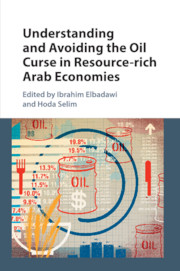Book contents
- Understanding and Avoiding the Oil Curse in Resource-rich Arab Economies
- Understanding and Avoiding the Oil Curse in Resource-rich Arab Economies
- Copyright page
- Contents
- Figures
- Tables
- Contributors
- Foreword
- Acknowledgments
- 1 Overview of Context, Issues and Summary
- 2 The Global Impact of the Systemic Economies and MENA Business Cycles1
- 3 Real Exchange Rates and Export Performance in Oil-dependent Arab Economies*
- 4 Dutch Disease in the Services Sector
- 5 The Political Economy of Public Sector Employment in Resource-dependent Countries1
- 6 The Oil Curse and Labor Markets
- 7 Resource Rents, Political Institutions and Economic Growth*
- 8 Fiscal Institutions in Resource-rich Economies
- 9 Savings and Investment Decisions from Natural Resource Revenues
- 10 Labor Market Heterogeneity and Optimal Exchange Rate Regimes in Resource-rich Arab Countries
- 11 The Institutional Curse of Natural Resources in the Arab World1
- 12 Has the UAE Escaped the Oil Curse?
- 13 Understanding and Avoiding the Oil Curse in Sudan
- Index
- References
5 - The Political Economy of Public Sector Employment in Resource-dependent Countries1
Published online by Cambridge University Press: 05 July 2016
- Understanding and Avoiding the Oil Curse in Resource-rich Arab Economies
- Understanding and Avoiding the Oil Curse in Resource-rich Arab Economies
- Copyright page
- Contents
- Figures
- Tables
- Contributors
- Foreword
- Acknowledgments
- 1 Overview of Context, Issues and Summary
- 2 The Global Impact of the Systemic Economies and MENA Business Cycles1
- 3 Real Exchange Rates and Export Performance in Oil-dependent Arab Economies*
- 4 Dutch Disease in the Services Sector
- 5 The Political Economy of Public Sector Employment in Resource-dependent Countries1
- 6 The Oil Curse and Labor Markets
- 7 Resource Rents, Political Institutions and Economic Growth*
- 8 Fiscal Institutions in Resource-rich Economies
- 9 Savings and Investment Decisions from Natural Resource Revenues
- 10 Labor Market Heterogeneity and Optimal Exchange Rate Regimes in Resource-rich Arab Countries
- 11 The Institutional Curse of Natural Resources in the Arab World1
- 12 Has the UAE Escaped the Oil Curse?
- 13 Understanding and Avoiding the Oil Curse in Sudan
- Index
- References
Summary
In this chapter, the authors propose a political economic explanation for the well-documented difference in labor market institutions between high natural resource per capita countries and those that are natural resource dependent but whose populations are large. This dichotomy is widespread but particularly apparent in the oil-rich countries of the Arab World. They argue that the natural resource endowment influences the policy that a dictatorship chooses. It is optimal for governments in countries of the first type to employ a large proportion of the population in the public sector, while it is optimal to set up a repressive security apparatus and employ a smaller proportion of the population when the natural resource endowment is small relative to the size of the population. Empirical support is provided for this theory using global data on public wages, rents per capita and other correlates.
- Type
- Chapter
- Information
- Publisher: Cambridge University PressPrint publication year: 2016
References
- 2
- Cited by



